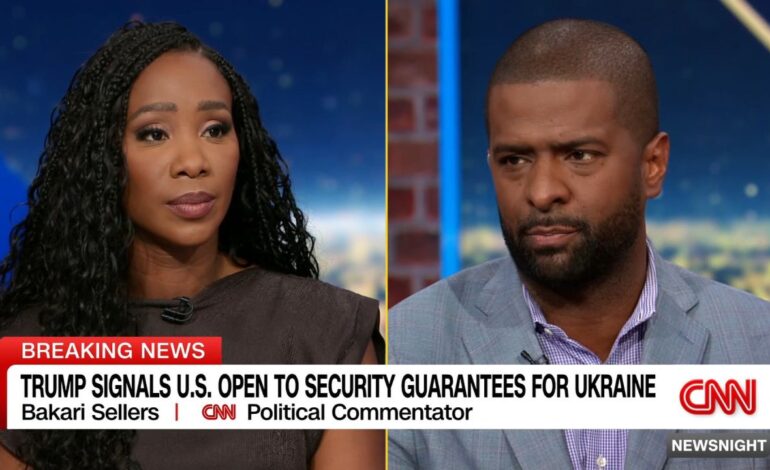Bakari Sellers Challenges Republicans on Trump’s Stance Toward Putin

During a recent meeting at the White House, President Donald Trump discussed potential military support for Ukraine as he hosted Ukrainian President Volodymyr Zelensky alongside several European leaders. This dialogue raised eyebrows, particularly among critics who have scrutinized Trump’s approach to international security and relations with Russia.
The discussion took place against the backdrop of escalating tensions in Eastern Europe. Trump’s willingness to consider deploying U.S. troops to bolster Ukraine’s security marks a significant shift in rhetoric. This move contrasts sharply with his previous statements regarding military intervention in foreign conflicts.
Political commentator Bakari Sellers voiced his concerns regarding the apparent inconsistency among supporters of Trump’s “Make America Great Again” (MAGA) agenda. He criticized those who, according to him, now appear supportive of U.S. military involvement in Ukraine, despite previously opposing such actions just months ago. Sellers highlighted the irony in their stance, pointing out the shift in public opinion within the Republican Party.
Increased Military Support for Ukraine
Trump’s meeting with Zelensky comes at a crucial time as Ukraine continues to navigate challenges posed by Russian aggression. The discussions included a range of topics, from economic assistance to military support. Trump emphasized the importance of ensuring Ukraine’s sovereignty while weighing the implications of U.S. military involvement.
For many, this moment serves as a litmus test for the Republican Party’s evolving stance on foreign policy. With the potential for U.S. troops on the ground in Ukraine, Sellers called on Republican leaders to clarify their position. He specifically challenged them to identify any direct threats that Trump has successfully addressed in relation to Russian President Vladimir Putin.
Sellers’ critique reflects a broader conversation about the GOP’s approach to international diplomacy and military engagement. As public sentiment shifts in response to global events, the party faces pressure to align its policies with the changing landscape.
Implications for U.S.-Russia Relations
The implications of Trump’s comments extend beyond U.S.-Ukraine relations. They touch upon the fragile balance of power between the United States and Russia. Concerns about military escalation are prevalent, with many analysts warning against the potential for increased hostilities.
As Trump continues to navigate the complexities of international relations, the responses from both political commentators and party leadership will be critical in shaping future policy. The ongoing dialogue about military support for Ukraine is likely to remain a contentious issue as the situation evolves.
The juxtaposition of Trump’s willingness to consider military options with his past statements raises essential questions about the coherence of his foreign policy. As the Republican Party grapples with these challenges, the upcoming months will be crucial in determining its trajectory and stance on international engagement.






